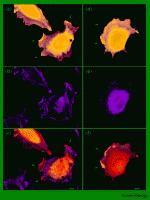Rebecchi Lab: Gene Regulation by Phosphoinositides, Ischemia and Reperfusion, Opiate Tolerance
 Ever since the sequencing of the human genome, it has been realized how little we understand of gene regulation. The three levels of chromatin organization: the linear sequence, the histone-supported nucleosomal structures, and the larger chromosomal interaction domains give rise to highly complex molecular machines, that regulate the onset and completion of DNA replication, as well as the synthesis, maturation and export of messenger RNA, yet many of the control elements remain to be defined. All of human biology and much of human disease may trace their origins to the temporal and spatial control of this apparatus. Ever since the sequencing of the human genome, it has been realized how little we understand of gene regulation. The three levels of chromatin organization: the linear sequence, the histone-supported nucleosomal structures, and the larger chromosomal interaction domains give rise to highly complex molecular machines, that regulate the onset and completion of DNA replication, as well as the synthesis, maturation and export of messenger RNA, yet many of the control elements remain to be defined. All of human biology and much of human disease may trace their origins to the temporal and spatial control of this apparatus.Our work revolves around the functions of rare lipids, the phosphoinositides, and a class of enzymes that hydrolyze them, phospholipase C. They and their metabolites are well known second messengers involved in a wide range of biological processes. Using small interfering RNA approaches, our studies reveal an essential role for these lipids in growth control and stress responses. The various techniques employed include of fluorescence microscopy, FACS, RT-PCR, and protein mass spectrometry. Other projects underway: a) a study of the mechanisms that underlie the responses of glia to injury; b) the role of phosphoinositides in anesthetic preconditioning in the heart; and c) mechanisms of opiate tolerance. |
 Detergent-resistant fraction of nuclear PIP2 and its localization with PLC1H356AEGFP in NIH-3T3 cells. Detergent-resistant fraction of nuclear PIP2 and its localization with PLC1H356AEGFP in NIH-3T3 cells. Stallings et al. J Biol Chem. 2005 Jun 10;280(23):22060-9
|

